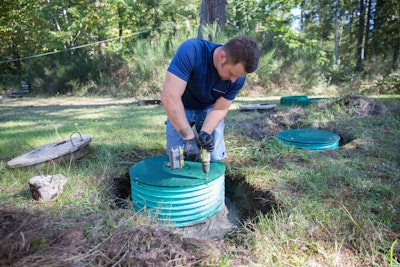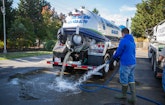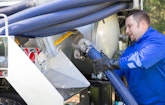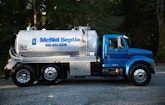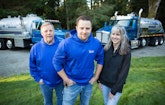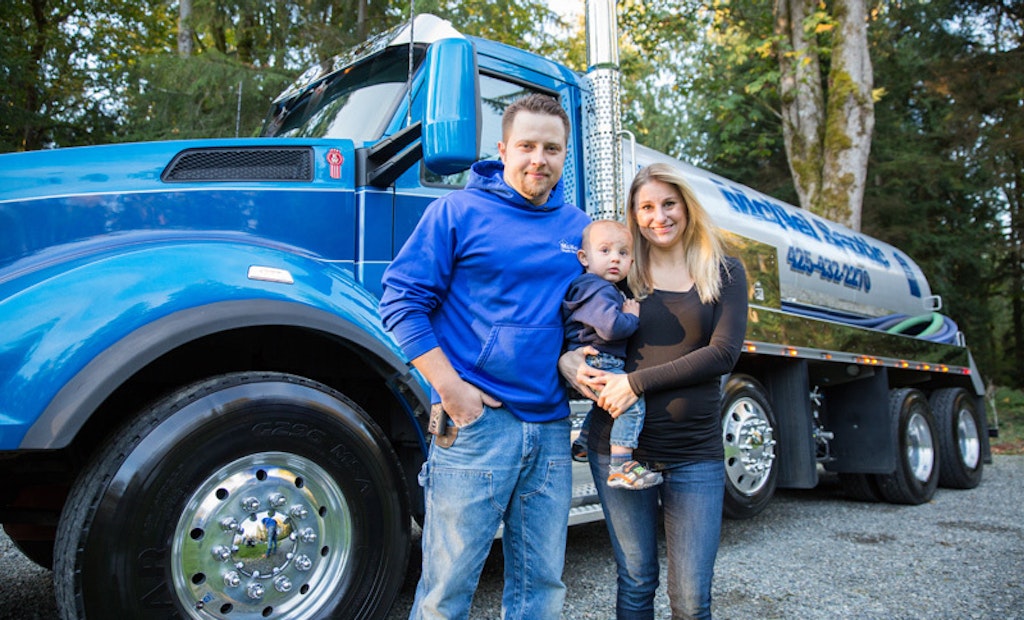
Interested in Plumbing?
Get Plumbing articles, news and videos right in your inbox! Sign up now.
Plumbing + Get AlertsTaking an established and successful pumping business to the next level can be a tall order, especially for a newcomer to the wastewater industry. But by emphasizing customer service and education — and adding a new specialty in septic system inspections — Shawn Carlton has accomplished just that at McNel Septic in Ravensdale, Washington.
In the five years since Carlton bought McNel Septic from Vernell Stigen (who founded it in 1995), revenue at the company has increased approximately 45 percent, largely as a result of adding inspection services. And Carlton recently plowed profits back into the company by investing in a new vacuum truck, a 2016 Kenworth built out by Erickson Tank & Pump with a 4,000-gallon tank and Masport pump.
The new truck helps Carlton better serve customers by increasing daily wastewater capacity. The investment reflects how the first-time business owner builds on the customer service lessons he learned from Stigen, who stayed on as a mentor after selling the business.
“After I took over, Vernell rode with me for about six months,” says Carlton. “He gave me a crash course in how to operate a truck and find the tanks. Vernell’s advice has been priceless — he’s always willing to talk to me.”
Carlton says he also learned a lot from attending classes sponsored by the Washington On-Site Sewage Association. Those classes also give operators a chance to pick each others’ brains and help each other handle business challenges, he says.
TAKING THE REINS
Just 32, Carlton runs the business with his father, Ken, who handles most service calls, and his mother, Robin, who manages the office and handles booking, billing and other administrative duties.
Carlton worked in the construction field after graduating from high school, primarily doing underground utility work. “I always liked working with equipment,” he says. “I worked my way up from being a ‘grunt’ to a foreman. But when the economy started going south, the work just wasn’t there anymore … and I also wasn’t where I wanted to be financially.”
At that time, Ken Carlton suggested to his son that the septic service industry would provide a good living. The more the younger Carlton thought about it, the more he realized that his father was correct; pumping septic tanks is an essential service that homeowners always need. So his father introduced Carlton to Stigen, a family friend who also happened to be looking to sell.
“The business was appealing because I wanted to be my own boss and it’s a fairly economy-proof industry,” Shawn Carlton recalls. “Even in a recession, if your toilet is backing up, you’re going to pick up the phone and call somebody.”
Many factors contributed to McNel’s growth, some small and some big, but all aimed at making things more convenient for customers. Having his mother available to answer the phone full time, for example, pays huge dividends because customers want to talk to a real person, not leave a message on an answering machine.
Carlton also points to the company’s reminder program: Once a month, the business mails postcards to customers due for pumping. “If we get only 10 jobs out of it, we’re money ahead,” Carlton says. “Plus, people appreciate that you’re thinking about them.”
The company also serves customers through a very inexpensive but effective marketing campaign: Small stickers that include the McNel name and phone number, along with a blank space to write down the date of the last tank pumping. “We stick it on their alarm panel,” he says. “It’s amazing how something as low-cost as a sticker yields such big results for us.”
Carlton also cites the company’s website as a big growth contributor, thanks to ever-increasing numbers of customers who prefer using the internet more than phone books.
INSPECTION INFLUX
But perhaps the biggest factor in the company’s growth was Carlton’s decision three years ago to become a certified inspector. The reason was twofold. First, it made life easier for customers — in this case, real estate agents who like the convenience of scheduling a tank pumping and an inspection with one call. Secondly, Carlton realized he was giving away revenue by referring inspections to other companies.
“Before, we were referring inspections to one or two other companies who didn’t do pumping,” Carlton says. “But the more I saw how it was done, the more I knew I could do it. And I didn’t like turning away the money, either.”
Carlton says he now performs an average of 12 inspections a week and they generate about 40 percent of the company’s annual gross revenue. Because the inspections are time-consuming — typically two or three hours — Ken Carlton now performs most of the pumping calls while his son handles inspections. “Inspections really increased profits for the company,” he notes. “We also get referrals from other pumping companies that don’t do inspections.
“Our service area has a great school district, so people want to move here,” he adds. “The housing market has picked up, so inspections have been insane lately. It’s a real blessing.”
Time-of-sale inspections involve a long checklist of tasks, such as finding and digging up the lid, checking the condition of the tank and its components and pumping the tank (if needed). If it’s a gravity system, Carlton also excavates the D-box to check its condition and performs a flow test, among other things. “Sometimes I use tracer dye to see if there’s effluent going offsite,” he adds.
Carlton also takes time to answer homeowners’ questions, which follows his philosophy that the best customer is an educated customer. He shares septic system do’s and don’ts and happily answers questions over the phone.
“Sometimes an alarm goes off and they don’t know what the problem is,” he points out. “So I explain some steps they can take to figure out what the problem is and avoid the expense of a service call. Or if I see something while pumping — the effluent screen needs cleaning or the baffles get plugged, for example — I’ll show them how to fix it themselves. If homeowners know how to maintain their system, the tank won’t be neglected the next time you go out to pump it. And it increases the longevity of the system.
“It might mean spending 20 minutes more per customer, which adds up each day,” he adds. “But you hope it keeps improving our reputation and increases word-of-mouth referrals. A little time is not a big deal if we get repeat business down the road.”
TOOLS OF THE TRADE
As the business grew, so did its roster of equipment. Along with the 2016 Kenworth vacuum truck, the company also owns a 1995 International 4900 with a 2,300-gallon steel tank, also built out by Erickson with a Masport pump. In addition, the company owns: a Mitsubishi mini-excavator, a 2003 Ford F-250 pickup, a 6 1/2-cubic-yard dump trailer made by Mirage Trailers and a flatbed tilt-top trailer made by Top Notch Trailers.
The company also relies on a locator from Prototek; VARCo Flexijoints, which help prevent hose break-offs; a Coretaker sludge sampler, made by Raven Environmental Products; a RIDGID SeeSnake camera and RIDGID locator and transponders; and a Crust Buster septic tank agitator.
In addition, Carlton says he uses 24-inch-diameter ultra-rib plastic pipe and lids from Orenco Systems to construct risers; he charges by the inch. He cuts the plastic pipe to the exact length a homeowner needs. If future landscaping changes require a taller riser, he uses adapter rings to increase the height.
To increase efficiency and improve customer service, Carlton also bought a hand-held credit card payment machine from Oceano. He says customers love it, not only for the payment convenience but the increased security.
“There’s none of this, ‘Let me write down your credit card number,’” he says. “They feel like it’s more secure when they can physically see me swipe a card right there, plus we don’t have to call it in and then wait (for it to be processed). They get a receipt right away and a handwritten invoice and they’re good to go.”
While the brisk pace of new-home construction in the area bodes well for expanding the McNel customer base, Carlton says he’s not shooting for exponential growth. He says he’d like to eventually gain enough new customers to warrant buying a third vacuum truck and hire another inspector. He also expects to hire another driver and an office manager when his parents retire in three or four years. His preference is for slow, controlled growth.
“Your quality control can go right down the drain … and as you get bigger, there’s so much more overhead to cover,’’ he says. “And if you grow bigger, you’re personally responsible for many more employees and their families. In addition, you tend to lose that personal approach that a small business allows you to provide.”
A GREAT INDUSTRY
Carlton says he never regrets embarking on a new career path. He enjoys interacting and developing relationships with customers, and solving problems.
“I still learn new things every day,” he says. “That’s the beauty of this industry … nothing is repetitive. It’s always a challenge to learn about new systems out there. I love troubleshooting problems.”
And making customer service a central focus for his company.
Embrace your frenemies
When Shawn Carlton needs advice or is backed up with so much work he can’t service customers quickly, he finds assistance from an unexpected source — his competitors.
Carlton is in the unusual position of having developed and nurtured solid relationships with other area septic pumpers.
“We’re all willing to help each other out and bounce ideas off one another,” he explains. “We’re not very worried about losing customers because there’s plenty of work out there, and if you do a good job, your customers are going to call you back.”
Carlton gives part of the credit for good competitor relations to his company’s former owner, Vernell Stigen, who over the years had developed a great reputation in the area. He also says he met and developed friendships with other pumpers at the local treatment plant. “That’s a great way to meet people and build relationships,” he says.
Those relationships come in handy when bigger jobs come along that require more than one truck, like a local school with a 20,000-gallon septic tank — and district officials who want the job performed quickly, not over the course of a couple days. In another example, Carlton recalls the time one competitor’s truck broke down, and another competitor helped by off-loading the waste from the broken truck’s tank so it could be towed in for repairs. Other times, a competitor may have a truck that’s too big to service a particular customer, necessitating a referral.
Having friendly competitors also pays dividends in terms of customer service. Carlton points out that if he can’t get to a job and that customer needs help quickly, it’s good to have someone he feels comfortable referring to that customer.
“We all refer jobs back and forth,” he explains. “If you can’t get to it, you want a reputable competitor to do it, so you do right by your customers.”
Carlton cites Dave Hudson at CLS Septics and Bill Krock at Warranty Septic as two of his most helpful competitors. “The value of those relationships is priceless,” he says. “Bill helps me out with inspection questions and Dave is my go-to guy when I have questions about system repairs. I would not have grown as quickly as I did without their help.”
